 Leading Blog | Posts by Month |
 Leading Blog | Posts by Month |
07.31.24

LeadershipNow 140: July 2024 Compilation
See more on
Posted by Michael McKinney at 09:34 AM
07.26.24

How to Use the Science of Personality to Make Better Decisions About People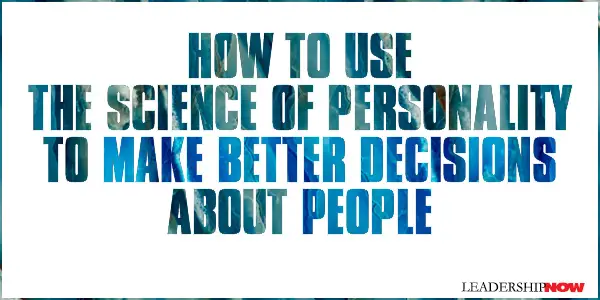
SOME of the biggest decisions we will make involve judgments about people—who to hire, who to marry, which friends to have, what job to take, or which business partner to take on. Good people judgment becomes a critical skill in all aspects of life. There are hundreds of ways to describe someone’s observable behavior. On the whole, these can be cumbersome and confusing. Instead, organizational psychologist Richard Davis writes in Good Judgment: Making Better Business Decisions with the Science of Human Personality we can use a manageable personality framework that allows us to identify patterns of behavior and quantifiable characteristics according to an individual’s personality traits. Research into human behavior has determined that we can distill personality down to just a handful of five traits called the Big Five: Openness, Conscientiousness, Extroversion, Agreeableness, and Neuroticism. As the science shows, we can describe our personality as a function of all five dimensions. We tend to be higher or lower in certain dimensions than in others, and we also tend to manifest specific traits differently in our behavior. Even so, the Big Five are not enough, and no personality test can capture the complexity of human behavior. As Davis states, “It’s one thing to understand whether a person has a given trait, quite another to know how that person will express that trait in their actual behavior, which is what we ultimately care about.” Using the Big Five as a guide, Davis has constructed a personality blueprint for judging character. The five categories briefly explained are: 1. Intellect — How People Think
2. Emotionality — How People Express Emotions
3. Sociability — How People Engage with Others
4. Drive — Why People Do What They Do
5. Diligence — How People Get Stuff Done
These five categories are not independent but come together to make up who a person is. Context matters. “The specific ways that individuals express their personality traits also help to determine if those traits are helpful or disruptive. So much rides not just on the specific traits people appear to express but on their ability to master whether and how they express them in everyday situations. Personality isn’t permanent as described here. We can decide to push back against our latent tendencies if we wish, disciplining ourselves to behave differently and developing workarounds. So, how do we use this information? Casual conversations work well for understanding others’ personalities if you know how to conduct them. Like a journalist conducting an interview, we can employ five strategies to enhance our perception: build rapport, get people to talk about their past, ask power questions, interpret what you are learning and how it fits into one of the five categories, and calibrate the interpretation to the context and the way they present themselves. Consider too your own biases when judging others. And above all, be curious. Davis details each of these strategies, the questions we should be asking, and how we might best interpret the information we gather. 
Posted by Michael McKinney at 04:51 PM
07.25.24

Leading Thoughts for July 25, 2024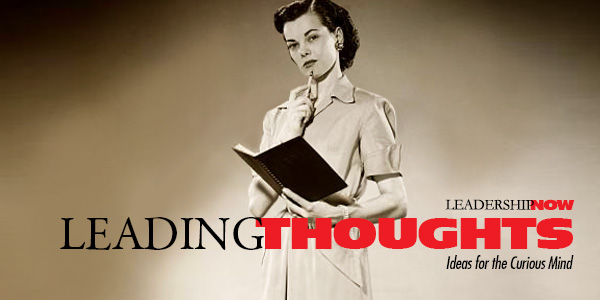
IDEAS shared have the power to expand perspectives, change thinking, and move lives. Here are two ideas for the curious mind to engage with: Greg Hoffman on inspiration: “Leaving inspiration to chance, where it just hits you in a random moment, is not a recipe for sustained success in the creative world. You have to go out and find it. While some may be born with a seeker’s mentality, others can learn to be more curious. Curiosity is a muscle, and muscles need to be trained.” Source: Emotion By Design: Creative Leadership Lessons from a Life at Nike Kerry Patterson, Joseph Grenny, David Maxfield, Ron McMillan and Al Switzler on deliberately practicing soft skills: “Few people, if any, would think of practicing with a coach to learn how to get along with coworkers, motivate team members to improve quality measures, emotionally connect with a troubled teen, or talk to a physician about a medical error. Most of us don’t even think that soft and gushy interpersonal skills are something you need to study at all, let alone something you’d study and practice with a coach. But that’s precisely what should be going on. Source: Influencer: The Power to Change Anything Look for these ideas every Thursday on the Leading Blog. Find more ideas on the LeadingThoughts index.
Posted by Michael McKinney at 02:50 PM
07.18.24

Leading Thoughts for July 18, 2024
IDEAS shared have the power to expand perspectives, change thinking, and move lives. Here are two ideas for the curious mind to engage with: Tom Asacker on leading with people: “Those skilled at motivating people to cross a new bridge to change their beliefs and behavior, are not trying to cajole or manipulate them against their will. Rather, they seek to guide them to a new destination, a transformed way of feeling, thinking and acting that's aligned with their personal desires and values. Source: The Business of Belief August Turak on the three types of transformation: “All human motivation arises from a longing for transformation. There are three different types of transformation. When thirsty man drinks, he transforms his condition. When a poor man the lottery, he transforms his circumstance. And when Mr. Scrooge wakes up on Christmas morning an utterly new man, he has experienced a transformation of being. Source: Business Secrets of the Trappist Monks: One CEO's Quest for Meaning and Authenticity Look for these ideas every Thursday on the Leading Blog. Find more ideas on the LeadingThoughts index.
Posted by Michael McKinney at 01:34 PM
07.11.24

Leading Thoughts for July 11, 2024
IDEAS shared have the power to expand perspectives, change thinking, and move lives. Here are two ideas for the curious mind to engage with: Nance Guilmartin on the need to take a pause: “Today you need the ability to discern what lies beneath people’s words, their reactions, or their silence. If you don’t build the neuropathways in your brain to pause, to momentarily disengage your automatic reactions, you can trigger a chain reaction that derails your best intentions and strategies.” Source: The Power of Pause: How to be More Effective in a Demanding, 24/7 World Lawrence Levy on the nature of innovation: “Culture is the invisible force on which innovation depends. We like to pin the mantle of invention on individuals, not circumstances. We anoint heroes and tell their stories. Yet innovation is a collective undertaking. It is as much the product of circumstance as of genius.” Source: To Pixar and Beyond: My Unlikely Journey with Steve Jobs to Make Entertainment History Look for these ideas every Thursday on the Leading Blog. Find more ideas on the LeadingThoughts index.
Posted by Michael McKinney at 10:54 AM
07.08.24

Why You Need a Culture of Growth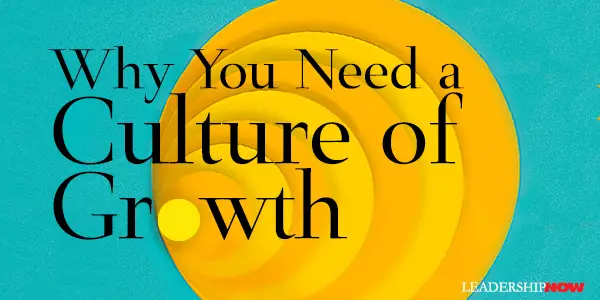
A SECRET to lifelong success is to always be in learning mode, personally and organizationally. In Cultures of Growth, Mary Murphy contrasts a Culture of Growth with its growth mindset and the fixed mindset of a Culture of Genius. These mindsets exist on a continuum. We don’t just have one or the other. We are not static. We frequently shift from one to the other depending on what we are experiencing. Instead of questioning if a person has a fixed or a growth mindset, the question we should ask is: “When are you in a fixed mindset, and when are you in a growth mindset?” In aiming to evaluate individuals’ mindset set points, organizations often end up putting an inordinate amount of focus on what employees bring to the table and not enough on how that table is constructed. Too often, we label people as one or the other without considering the context and the culture that creates and maintains a particular mindset. “The culture surrounding us is one of the biggest influences on our beliefs, motivations, and behavior. This mindset culture exists at the group and organizational level.” Critical to our job as leaders is the understanding that “Mindset culture is so powerful that it can actually block an individual’s growth mindset.” A Culture of Growth encourages confidence and intrinsic motivation, process orientation, a tolerance for risk, and resilience. A Culture of Genius is characterized by know-it-alls, status, talent, competition, task orientation, limited potential and opportunities, and a lack of trust.
Cultures of Growth are what we think of when we talk about learning organizations; every day is a treasure hunt, with employees searching for novel ideas to improve products and processes. Cultures of Genius are primarily leaning organizations, which lean on the status quo or how things were done in the past to direct their current efforts. A fixed mindset is not all bad. A fixed mindset can be useful in some situations, but it should be tempered with the humility to see other perspectives. A chronically fixed mindset will restrict our ability to see the possibilities in ourselves and others. Events can trigger fixed mindsets. The job of leaders is to minimize that and teach people to reframe events to encourage a growth mindset. It’s not important to have all of the answers but to encourage others to find the answers. Murphy suggests that the situation and the culture we are in often plays a “stronger role in shaping our behavior than our character does.” Sadly, this is true. But it does reflect a lack of character. Character compels us to do what we know is right in spite of our situation and what those around us may allow. That said, we should ensure that the culture we are responsible for does not place people in a situation that encourages them to compromise. Poorly thought-out performance goals and incentives can do just that. Murphy identifies four areas that are prone to placing us into a fixed mindset that we should be aware of: evaluative situations, high-effort situations, critical feedback, and seeing the success of others. When we anticipate a situation where we are being evaluated by others, we naturally tend to go on the defensive. We become hyper-focused on defending our performance rather than improving our thinking and behavior. Think contribution and not competition. High-effort situations require that we apply more effort, time, and attention than we have in the past. In a fixed mindset, we negatively correlate our abilities with the effort required to succeed. “If I have to work this hard, then I must not have what it takes to see it through.” A growth mindset reframes the situation with the belief that this is a challenge that can push us to learn and discover the path to reach our goals. Murphy cautions, “A growth mindset isn’t just about putting in sheer effort; it’s far more discerning than that, and it’s also far more expansive. When we’re in our growth mindset, we find ways to invite challenge in and to play with the struggle it brings. We focus on possibilities, try new strategies, and experiment. And we do it in a conscious, thoughtful way.” Like evaluative situations, when it comes to critical feedback, most of us initially react with a fixed mindset. We tend to take it personally, especially if it is vague and delivered in a judgmental manner. That’s when we need to ask ourselves, “Do I want to be better, or feel better?” When we’re in our growth mindset, our learning and development are priorities, so we are constantly attending to where we are recalibrating our perceptions and expectations, fine-tuning our self-awareness in these areas. We’re able to engage in a more subtle discernment process when faced with critical feedback than when we’re in our fixed mindset. When we do receive feedback that doesn’t comport with where we believe we are, we are better equipped to evaluate its usefulness. When people are coming from their own fixed mindset, their feedback is not about growth, but is more designed to make themselves feel better about their own issues. Even then, you can find hidden gems to help you better understand the situation you find yourself in. Jealousy will put us in a fixed mindset. Feeling threatened, we begin to internalize reasons why we can’t do what they did or assume that they are just better than we are. Success, we think, is outside of our control. In this state, we fail to see what we need to do to achieve the success we seek. A Culture of Growth may not change us overnight, but it will provide a perspective that allows us to see better the possibilities for other ways of being and functioning. An environment where growth is prioritized shapes how we make sense of the world around us and how we can reach our potential within it. 
Posted by Michael McKinney at 01:41 PM
07.05.24

What is the Gouge?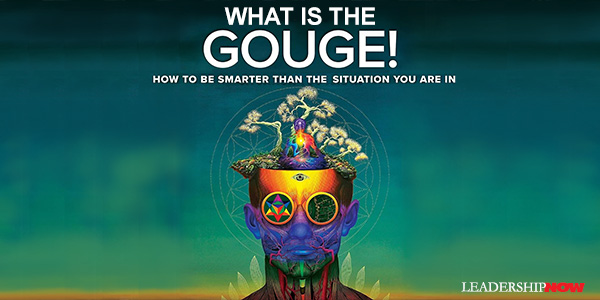
NAVY SEALs talk about the Gouge. But what is it? It’s not a thing but mental readiness—a preparedness that is based on some foundational beliefs. It is a place you bring yourself and others to mentally. It is defined by Admiral and former Navy SEAL Bob Harward in The Gouge!, as “the contract we all have with humanity, sharing the best of everyone for the collective well-being of all. It was always intended to be information you could believe in, people you could trust, organizations you could rely on because it came from people who wanted the best for you, and therefore good for all.” What caught my attention was the subtitle of the book: How to Be Smarter Than the Situation You Are In. The Gouge is more than just good advice shared with others. It is a perspective that brings out the best in others. It is a decision-making tool that presents obstacles as choices. Harward explains: Each choice is filtered through the collective experience and wisdom of those participating and reinforced accountability to each other and to yourself, faith in one another, and inherent trust, which facilitates deliberate action. Once the choice is made, you’re committed and focused on making the right choice. To have Gouge, you must be a tuned-in person with the following fundamental beliefs: Mission First. People Always. We can make others better every day. As a leader, “you are a participant in human development. If we can take care of people and each other, the rest of it will come.” Looking out for others builds trust and confidence. The mission succeeds when people succeed. Purpose Defines You. Embrace It. It all comes down to purpose. Leaders reinforce and leverage purpose. “If Gouge is about the information that links -all of us together, our purpose is the bedrock on which Gouge is built. It determines who you are, reinforces your belief, and ultimately determines your success.” We Are All Accountable for Ourselves and Others Looking out for each other requires accountability at all levels. It must come from above and below. “Lack of accountability is a slippery slope that is hard to stop once it festers itself in any organization or team. Accountability and confrontation are aligned. If you’re going to avoid confrontation, you’ll never hold anyone accountable.” Constructive, forward-looking confrontation is a part of accountability. Anonymity kills accountability. You don’t have to own what you say. While social media can be used for good, it has created cultural accountability problems. “Tweeting. Posting on Facebook. All of those sites put a barrier between human connection, allowing people to refuse accountability for what they’re saying or doing.” The best leaders know how to effectively implement it to get the best results for their team so they can fulfill their purpose. During any confrontation, remember we are one community with a purpose. Faith In People Is My Religion Faith in each other builds community. “It is essential because if you don’t have faith in one another, there is no trust, no passing of information or guidance, and the whole system breaks down.” This faith is placed in the bond between two people, casting your dot with your fellow man in hopes of achieving a common goal. Never Quit, but Saying No Is Always an Option For Navy SEALS, quitting is a mortal sin. No matter the demands, never quit. But there are times when the best Gouge is to quit. Sometimes, saying no is “just an opportunity to say yes to something else.” Sometimes, saying no forces you to live up to your maximum potential. Great Leaders Share Gouge Empower and support others through Gouge. Show them through your actions. “By showing your people that you see them not as a way to accomplish a mission but as teammates working with you to accomplish a mission. Make sure everyone is armed with the best information so they can not only do the job but so they can sync it with their purpose.” What About Bad Gouge? When people are working at cross purposes, there is bad Gouge. When you find yourself in a new situation, you need to recalibrate. “You have to think to yourself: Is someone trying to sell me something? Does it benefit this person/company in any way if they influence my thinking one way or another? Does this person have credibility?” Many times, bad Gouge is simply being surrounded by the wrong people. Good Gouge only comes from relationships where everyone is on the same page and working toward the same goal. Identify Your Own Gouge To identify your Gouge, “think about the essential personal and professional information you want your employees, team, and children to know. Focus on empowering those around you instead of yourself, and watch how successful you become. Always look to better yourself and better those around you, and always be courageous enough to communicate it. The Gouge is very simple. It is information used to create a better outcome for all.” 
Posted by Michael McKinney at 06:07 PM
07.04.24

Leading Thoughts for July 4, 2024
IDEAS shared have the power to expand perspectives, change thinking, and move lives. Here are two ideas for the curious mind to engage with: Peter Block on freedom and accountability : “Freedom being the choice to be a creator of our own experience and accept the unbearable responsibility that goes with that. Out of this insight grows the idea that perhaps the real task of leadership is to confront people with their freedom. This may be the ultimate act of love that is called for from those who hold power over others. Source: Community: The Structure of Belonging Peter Koestenbaum on free will and responsibility: “Freedom is a fact inside your heart. It is your most precious possession. It gives you power over your life. It gives you the benefit of being responsible for your existence and accountable for your life. Free will cannot be explained scientifically—only philosophically, poetically, religiously, or mythologically. Claiming your freedom is the ultimate secret for mastering your life.” Source: Leadership: The Inner Side of Greatness—A Philosophy for Leaders Look for these ideas every Thursday on the Leading Blog. Find more ideas on the LeadingThoughts index.
Posted by Michael McKinney at 07:11 AM
07.01.24

First Look: Leadership Books for July 2024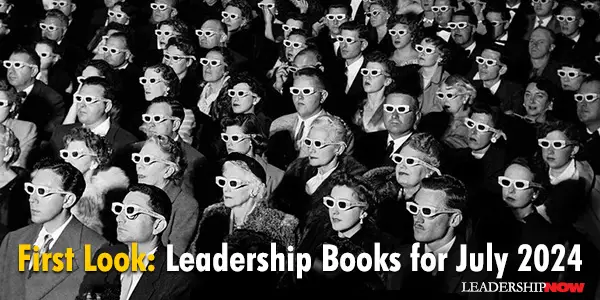
HERE'S A LOOK at some of the best leadership books to be released in July 2024 curated just for you. Be sure to check out the other great titles being offered this month.
In Lead Boldly, peak performance coach Hugh Blane shares his three guiding principles for converting human potential into inspired performance. He does this by providing a detailed road map for transforming a leader’s results at work and home in unprecedented ways. Lead Boldly makes the compelling case that there are vast levels of untapped potential in every corner and cubicle of organizations. Because of unparalleled stress, burnout, disengagement, and continual distraction, employers are sitting on a treasure trove of potential but have, until Lead Boldly, lacked the keys to developing the mindset and skill set to unlock it.
The breakthrough concepts of Pattern Breakers come from the observations of Mike Maples Jr., a seasoned venture capitalist, who noticed something strange. Start-ups like Twitter, Twitch, and Lyft had achieved extraordinary success despite their disregard for “best practices.” In contrast, other startups deemed highly promising often failed, even when they seemed to do everything right. Pattern-breaking success, they reveal, demands a different mindset and actions to harness developments others miss or that may, at first, seem crazy. Maples and Ziebelman vividly illustrate an unexpected world where chaos is welcome, naysayers are a positive signal, movements galvanize believers—but one that ultimately change the future. They challenge us to rethink how to transcend the ordinary and achieve the extraordinary.
From former Navy SEAL, entrepreneur, father, and New York Times bestselling author Mark Divine comes Uncommon—an inspirational book following Mark Divine's trademark warrior monk philosophy that will lead you to the summit of personal development. To be common is to be an everyday person. It's to do the things that you are expected to do, whether that's what your parents want for you, or your employer, or your spouse, et cetera. But if you want to be more than you are, more than you think you can be, then you need to recognize and learn from your mistakes to lead a life of excellence.
Supercharge the wellbeing and productivity of everyone around you using the power of encouragement. In The Art of Encouragement, renowned performance coach and keynote speaker Jordan Montgomery delivers a captivating story designed to walk the reader through a dramatic journey of heartfelt, easy-to-understand lessons about encouragement and its many facets. The author compels you to take action by showing you that you're fully equipped and ready to implement encouragement within your own organization, team, family, and community.
In From Conflict to Convergence, two expert collaborative problem solvers deliver an incisive, hands-on guide to de-escalating conflict and constructively engaging with those you disagree with to find better solutions to problems. In this book full of real-life stories and examples, you'll find a collection of tried and tested strategies you can employ immediately as you negotiate and navigate your most seemingly intractable conflicts. You'll learn how finding what the authors call “higher ground” can advance your interests even when facing people and groups you think you have little in common with and how this can set the stage for longer term cooperation.
In The Soil of Leadership, Dr. Britt Yamamoto presents a unique and memorable perspective on leadership that challenges conventional wisdom for guiding others. Inviting us to “dig where we stand,” The Soil of Leadership seamlessly weaves evocative metaphors and captivating narratives from Dr. Yamamoto’s life as both a sustainable farmer and organizational leader. Through these vivid examples, he illuminates the profound notion that genuine leadership doesn’t solely emerge from visible accomplishments; rather, it thrives within the hidden roots that allow our true potential to flourish.
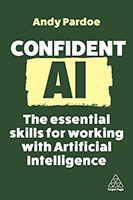 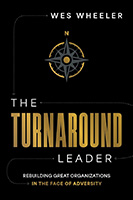 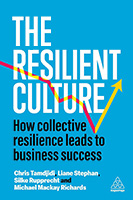 
“Miss a meal if you have to, but don't miss a book.” — Jim Rohn
Posted by Michael McKinney at 06:59 AM
|
BUILD YOUR KNOWLEDGE


How to Do Your Start-Up Right STRAIGHT TALK FOR START-UPS 
Grow Your Leadership Skills NEW AND UPCOMING LEADERSHIP BOOKS 
Leadership Minute BITE-SIZE CONCEPTS YOU CAN CHEW ON 
Classic Leadership Books BOOKS TO READ BEFORE YOU LEAD |
|